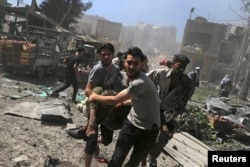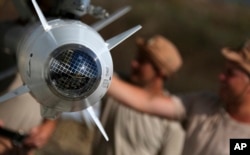Syria's political turmoil and Islamic State unrest will be high on the agenda for U.S. Secretary of State John Kerry as he leaves Thursday on a three-nation trip to Tunisia, Austria and Turkey.
In Austria, Kerry will join officials of other world powers Saturday for the second round of talks on Syria’s political future, following their initial round in late October.
In a communique, 17 world powers, the United Nations and the European Union agreed on the importance of accelerating diplomatic efforts to end Syria’s civil unrest.
They also agreed to a U.N.-led process that would include talks between the Syrian government and the moderate opposition, along with a possible cease-fire.
Stark differences remain over some issues, however, including the status of Syrian President Bashar al-Assad.
At the end of the first round of talks in Vienna, Kerry said, “[Russian Foreign Minister] Sergei Lavrov, [Iranian] Foreign Minister [Mohammad Javad] Zarif and I and others agree to disagree. The United States’ position is there is no way that President Assad can unite and govern Syria.”
Proposals floated
Russia has floated several proposals for the upcoming talks.
It circulated a plan for ending the Syrian war that calls for drafting a new constitution in up to 18 months, followed by presidential elections in 2017.
Syrian opposition groups said the plan is unacceptable, though, because Russia's goal would be to keep President Assad in power. Western diplomats have indicated the plan will not be a focal point in upcoming talks.
Additionally, Russian Foreign Minister Sergey Lavrov said world powers meeting in Vienna need to agree on a list of terrorist organizations in Syria. An agreement would be part of a broader plan to identify the country's legitimate opposition groups.
"There is no meaningful moderate opposition," said Anthony Cordesman, a defense and security analyst at the Center for Strategic and International Studies.
"There are people who have a certain credibility as figures," said Cordesman. "They do not represent any clear factions or large majority of Syrians," he added.
The makeup of the Vienna talks, however, could help produce progress on this issue, according to Perry Cammack, a Middle East Analyst at the Carnegie Endowment for International Peace.
"The Vienna talks themselves are a broad tent, so I think we need to use that principle for the opposition as well, to include as many groups as we can," he said.
Troubled times for Tunisia
Kerry's first stop will be Tunisia, a country that received broad U.S. praise for its democratic reforms in the aftermath of the Arab Spring uprising.
The country's economy, however — in particular its tourism sector — has slowed following deadly terrorist attacks in March and June. Islamic State militants claimed responsibility for both attacks.
Kerry will meet with officials including President Beji Caid Essebsi, as part of the second U.S.-Tunisian Strategic Dialogue. The talks also are a follow-up to President Essebsi’s May visit to Washington.
The U.S. has played a significant role in helping Tunisia stabilize its democratic institutions in the aftermath of the 2011 Arab Spring.
“We have been standing firmly with Tunisia since the revolution,” said a senior State Department official in a Thursday briefing.
“We have provided over $700 million in assistance across the fields of economic support, development support, security, governance and so on,” the official said.
Last month, Tunisian Hotel Federation chairman Radhouane Ben Salah told Mosaique FM radio that at least 70 hotels had closed since the terrorist attacks earlier this year.
The senior State Department official said in the aftermath of the attacks, the U.S. and other world powers had stepped up security consultations with Tunisia.
Kerry wraps up his three-nation tour in Antalya, where he will join President Barack Obama for a G-20 Leaders Summit.








